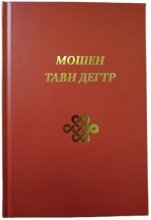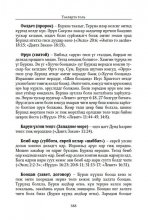

The Institute for Bible Translation (IBT) has published a translation of the Pentateuch into the Kalmyk language. In ancient Hebrew, the first five books of the Old Testament that make up the Pentateuch are called "Torah," which means "instruction" or "learning." Kalmyk readers, most of whom come from the Buddhist tradition, will now be able to discover for themselves the wonderful world of biblical history: the Pentateuch lays the foundation of Old Testament religion with its moral principles, describes the creation of the world and humanity, and tells how sin and suffering came into our world and distorted the relationship between God and people.
The first book of the Pentateuch, Genesis, was previously translated into Kalmyk and published in 2005. The other four books (Exodus, Leviticus, Numbers and Deuteronomy) were translated between 2017 and 2022. The translation was done by Vera Shugrayeva, a well-known poet and honored cultural worker among the Kalmyks. Others who took part in this work were exegetical advisor Alexander Kondakov, philological editors Elistina Shinyakayeva and Lyubov Pyurveyeva, field tester Nina Avyashkiyeva, and consultant Alexei Somov.
The translation is based on the Masoretic Hebrew text. In order to translate the various nuances of ancient Hebrew law, worship and sacrifice into Kalmyk, many neologisms were developed in the process of translation. Some of these are completely new to the Kalmyk language and culture, and are therefore included in the glossary, which explains important biblical terms and concepts, ancient weights and measures, and people and place names. Also included is a family tree of the twelve tribes of Israel and several maps of the ancient Near East.
The present edition, as well as all other Scripture portions in Kalmyk, can be read, listened to, and watched in various digital formats on the IBT website. We also invite you to download the handy Bible app (Android, iOS) containing all the books of the Bible so far translated into Kalmyk.
Kalmyk belongs to the Western Mongolic language family. According to the Russian population census of 2021, the number of Kalmyk-speakers in Russia totaled 107,742 people, while there were 179,547 ethnic Kalmyks in all. The Kalmyk language and literature is studied at the Kalmyk Research Center of the Russian Academy of Sciences. Kalmyk language specialists are trained at the Institute of Kalmyk Philology and Oriental Studies at Kalmyk State University in Elista. In Kalmykia, the language is studied in kindergartens and schools. The newspaper Khalmg urn ("Kalmyk Truth") is published in Kalmyk, while the literary and political magazine Teegin Gerl ("Light in the Steppe") and the children's magazine Bair ("Joy") are published in Russian and Kalmyk. The Kalmyk radio program Bumba is broadcast via the internet.

Share: